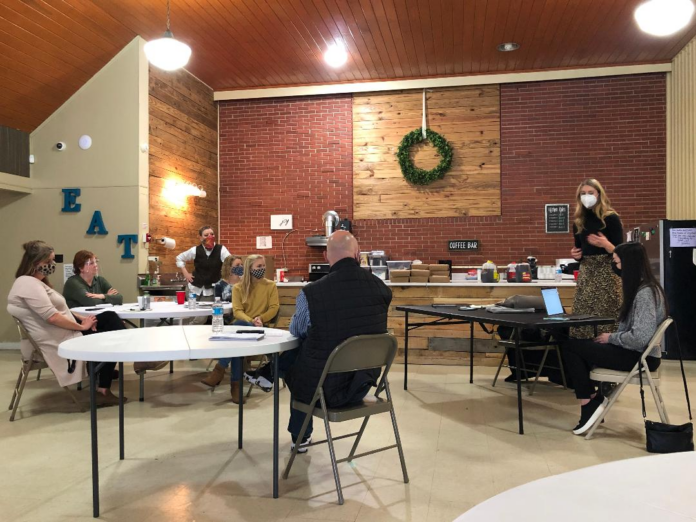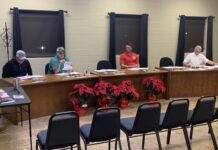
CULLMAN, Ala. – The Link of Cullman County on Wednesday hosted a roundtable discussion about substance abuse in the Cullman area, focused on identifying resources available to respond to the crisis, as well as barriers to response. The event was sponsored by the Montevallo-based David Matthews Center for Civic Life in conjunction with the Alabama Medicaid Agency, Alabama Department of Mental Health and the University of Alabama School of Social Work’s VitAL program as part of the Alabama Provider Capacity Project (APCP).
APCP describes itself as “a statewide assessment to gain an understanding of Alabama’s current capacity to address the substance use and opioid crisis.
“The goal of the project is to identify opportunities for decreasing the extent of health disparities related to substance use disorder (SUD) and opioid use disorder (OUD) within Alabama’s low-income communities.
“APCP proposes to increase Alabama’s capacity to provide substance use treatment by creating a pipeline to expand provider participation options. This project places great emphasis on promoting the principles of a whole person integrated care, a continuum of care, and seamless coordinated care systems.
“The insights gathered from this research could be used to strengthen Alabama’s Medicaid health systems by
- Leveraging existing resources to reduce the morbidity and mortality of SUD,
- Facilitating new provider participation processes, and
- Utilizing telehealth technologies to intensify provider capacity.”
Participants in Wednesday’s conference included Link staff, local ministers, representatives of local government agencies and news media. Much of the discussion centered on identifying local organizations and resources for substance abuse response and treatment, barriers to getting treatment and the impact of COVID on treatment programs.
Listed organizations offering services, directly or indirectly, to people recovering from substance abuse included:
- Celebrate Recovery – recovery support group based in Holly Pond
- Cullman County Drug Court – long-term recovery program for those convicted of crimes related to substance abuse
- Cullman County Veterans’ Court – recovery program focusing on multiple issues including PTSD and substance abuse, that often plague the veteran community
- Restoring Women Outreach – long-term residential recovery program for women
- Saving Forgotten Warriors – veterans’ support organization focused on homeless veterans, but offering a wide range of services to vets struggling to return to civilian life
- Society of St. Monica – faith-based substance abuse recovery support group at Sacred Heart Church
- The Bridge – support group for adolescents with substance abuse issues
- The Foundry – long-term residential recovery program for men
- WellStone Behavioral Health – full-range mental health service
The group discussed issues facing recovering addicts and service providers, including:
- Lack of transportation to services and facilities
- Lack of facilities to provide long-term care or initial detox
- Lack of financial resources to pay for treatment programs
- Lack of childcare for parents attending recovery programs
- Social isolation due to COVID
Asked what the priorities should be for responding to substance abuse in the Cullman area, participants presented three main suggestions:
- Create resources for transportation to services and facilities
- Create affordable housing in the Cullman area, as people are more likely to recover successfully in safe and secure environments
- Make state funding available to faith-based recovery programs, which have been shown to have a higher recovery rate and lower recidivism rates than purely secular programs.
Link Team Leader Julie Hall told The Tribune after the meeting, “We were very excited to host the Alabama Provider Capacity Project discussion forum in partnership with the David Mathews Center for Civic Life. When various types of service providers in a given area come to the table to discuss, both, what is effective and what the barriers are in Substance Use Disorder treatment everyone leaves better prepared to serve the community. When an organization like DMCCL carries that information to policy makers at the state level, the increased awareness can open avenues for furthering treatment and support services for families and individuals affected by SUD. We look forward to seeing how God uses this event and the information gathered at subsequent events throughout the state to assist organizations in their work with families seeking freedom from Substance Use Disorder.”
APCP is holding similar events across the state, explaining, “Community focus groups and surveys in all 67 of Alabama’s counties will help APCP understand existing resources, local needs and gaps in our system. The first step in a larger effort to create solutions for Alabama’s substance use and opioid epidemic, participation will allow the public to make an impact on their community.
“This research is not like just any regular focus group and survey. Participants from each county are individually selected based on their role in the community to encourage rich and informed discussions. The focus groups will be interactive and involve visual components to organize ideas about SUD (Substance Abuse Disorder) treatment in Alabama.”
For more information on the substance abuse crisis in Alabama, see this fact sheet from vitalalabama.com/APCP (https://vitalalabama.com/wp-content/uploads/2020/10/Fact-Sheet.pdf). For more on the Alabama Provider Capacity Project, visit https://vitalalabama.com/apcp/.
Copyright 2021 Humble Roots, LLC. All Rights Reserved.





























